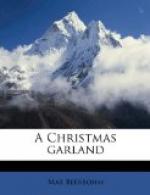It is doubtful whether the people of southern England have even yet realised how much introspection there is going on all the time in the Five Towns.
Visible from the window of the Wrackgarths’ parlour was that colossal statue of Commerce which rears itself aloft at the point where Oodge Lane is intersected by Blackstead Street. Commerce, executed in glossy Doultonware by some sculptor or sculptors unknown, stands pointing her thumb over her shoulder towards the chimneys of far Hanbridge. When I tell you that the circumference of that thumb is six inches, and the rest to scale, you will understand that the statue is one of the prime glories of Bursley. There were times when Emily Wrackgarth seemed to herself as vast and as lustrously impressive as it. There were other times when she seemed to herself as trivial and slavish as one of those performing fleas she had seen at the Annual Ladies’ Evening Fete organised by the Bursley Mutual Burial Club. Extremist!
She was now stirring the pudding with her left hand. The ingredients had already been mingled indistinguishably in that rich, undulating mass of tawniness which proclaims perfection. But Emily was determined to give her left hand, not less than her right, what she called “a doing.” Emily was like that.
At mid-day, when her brother came home from the Works, she was still at it.
“Brought those scruts with you?” she asked, without looking up.
“That’s a fact,” he said, dipping his hand into the sagging pocket of his coat.
It is perhaps necessary to explain what scruts are. In the daily output of every potbank there are a certain proportion of flawed vessels. These are cast aside by the foreman, with a lordly gesture, and in due course are hammered into fragments. These fragments, which are put to various uses, are called scruts; and one of the uses they are put to is a sentimental one. The dainty and luxurious Southerner looks to find in his Christmas pudding a wedding-ring, a gold thimble, a threepenny-bit, or the like. To such fal-lals the Five Towns would say fie. A Christmas pudding in the Five Towns contains nothing but suet, flour, lemon-peel, cinnamon, brandy, almonds, raisins—and two or three scruts. There is a world of poetry, beauty, romance, in scruts—though you have to have been brought up on them to appreciate it. Scruts have passed into the proverbial philosophy of the district. “Him’s a pudden with more scruts than raisins to ’m” is a criticism not infrequently heard. It implies respect, even admiration. Of Emily Wrackgarth herself people often said, in reference to her likeness to her father, “Her’s a scrut o’ th’ owd basin.”
Jos had emptied out from his pocket on to the table a good three dozen of scruts. Emily laid aside her spoon, rubbed the palms of her hands on the bib of her apron, and proceeded to finger these scruts with the air of a connoisseur, rejecting one after another. The pudding was a small one, designed merely for herself and Jos, with remainder to “the girl”; so that it could hardly accommodate more than two or three scruts. Emily knew well that one scrut is as good as another. Yet she did not want her brother to feel that anything selected by him would necessarily pass muster with her. For his benefit she ostentatiously wrinkled her nose.




